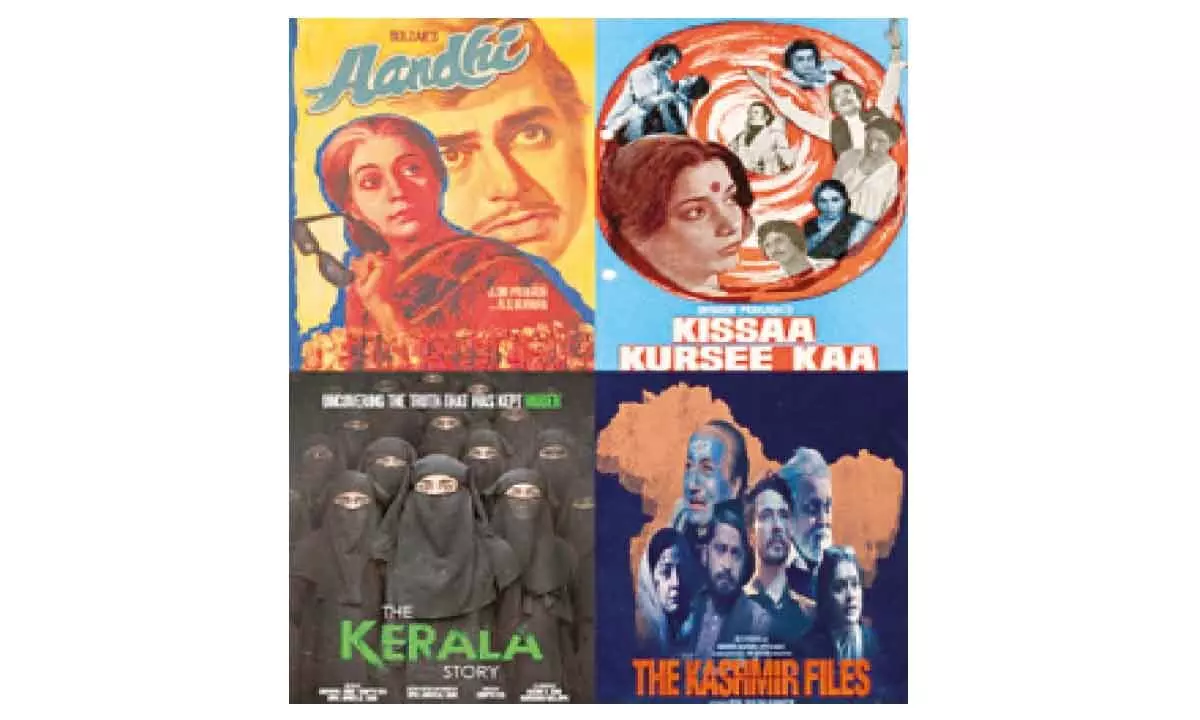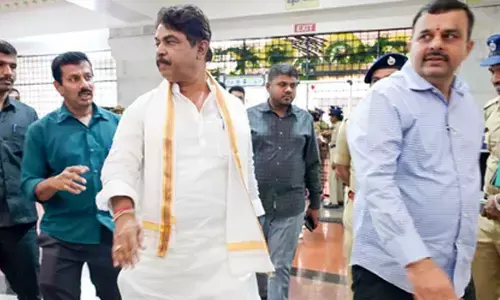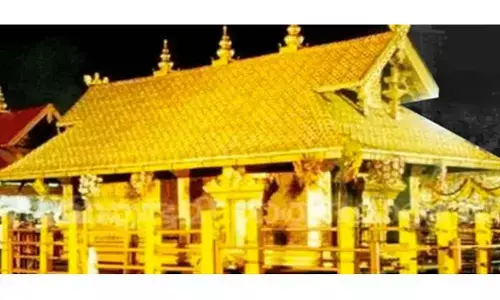Peril or pain: Thoughts on cancel culture

Things have changed and the politicians don’t muddy their hands by directly giving calls to ban a book or a film. Why do they need to do that? There are so many ambitious, albeit undeserving, folks wanting to grab the limelight. Thanks to the Ban Brigade, people want to see such films and honour the makers for their work. What is more, the governments which did not act on the issues at stake in Kashmir and Kerala are promoting such films by triggering open debates and giving tax exemption. A state’s share of the tax on a cinema ticket is just 9 per cent, but the idea is more to give a symbolic endorsement to a film
The ban culture and the jail culture have always existed in India. The British did it and so did the post-independence rulers. The first Prime Minister of India did it and the rest of the family, which ruled the country, followed suit.
Jailing a person was the privilege of the rulers, the one enjoying the high office of the Prime Minister. It had nothing to do with the excuses that are offered now, such as: disturbing harmony, spreading unrest, hurting religious sentiments, and so on. Books, talks and creativity were banned randomly.
In between, the trend was to jail people. It had nothing to do with public perceptions, but all about the undemocratic way of running a democratic country.
Things have changed and the politicians don’t muddy their hands by directly giving calls to ban a book or a film. Why do they need to do that? There are so many ambitious, albeit undeserving, folks wanting to grab the limelight, earn fame by creating a nuisance value with the ultimate aim to create a following and a career in politics.
The politicians’ hobby of jailing even the biggest of names never aroused any anger or reactions from people. They hardly came to know about the arrests. Say, in the case of Majrooh Sultanpuri, who was jailed for a year because of his comments against the PM of that time. The PM had no patience for criticism and not only went on a banning spree, but also brought in the first amendment to the Constitution, limiting the freedom of speech and expression.
In the mid-1970s, when the Emergency was in force, the film ‘Aandhi’ was banned because the Prime Minister at that time thought the film aimed to show her in a bad light! Amrit Nahata’s film, ‘Kissa Kursi Kaa’, was not only banned, even its negatives were consigned to fire! Nahata was a two-term Congress Member of Parliament, but that did not help him or his film. The film was remade. A very poorly made political satire, it bombed badly at the box office.
‘Aandhi’, when released, turned out to be the story of a woman driven by her ambitious politician father to make a career in politics at the cost of her marriage. The film did well, thanks to powerful performances by Sanjeev Kumar and Suchitra Sen, and the musical score that reverberates even today.
Films and filmmakers were fair game. Censor Board folks thought they had read the intentions of the government and they closely scrutinised just about every film and suggested innumerable cuts. Intimate scenes between the lead stars were taboo, so were action scenes in the land of the Mahabharata and Ramayana! Film folk felt so harassed and humiliated that post emergency, matinee idol Dev Anand decided to float a political party to contest the elections against the ruling party! But film people normally are the ‘forget it and move on’ kind. The idea died soon as it was conceived.
This was the time when it did not need a despotic politician or a party to ban films. The Censor Board did the bidding of their political master. The members were more-loyal-than-the-king types. Finally, when any film got a censor certificate, a triangle on the certificate, which indicated cuts in the film, was prominent (the cuts imposed by the Board were listed on the back of the certificate and putting up the complete list often required a long sheet of paper.) The film trade in those days called it a massacre, so you can imagine!
There was no anger because the film fraternity to which Majrooh belonged lacked the courage to raise its voice and so did the media, which did not want to take up cudgels against the powers that be. The people did not know what was happening and, probably, did not care. Films were being made and melodious songs were still being composed. Things went unnoticed.
The trend of sending artistes to jail was diluted, for banning was seen to be more effective. Kishore Kumar songs were banned on the government-owned radio services in the mid-1970s because he refused to grace an event organised by Sanjay Gandhi, not even a government official!
This was in the peak of Kishore Kumar’s popularity and the idea was to hit where it hurts most, namely, the wallet. No filmmaker would want a banned artiste to sing for his film. If songs worked with people, so did the film. and the government-owned radio channel was the only way to popularise a film’s music, for few could afford gramophones, not to mention the highly priced music records. Luckily, it did not work that way eventually.
The ban culture has spread and been assumed by various community, religious or other groups. Maybe, those in power have outsourced the job. It created a vote bank. Take for example the 1982 film ‘Ramnagari’ by the National Award winner Kantilal Rathod. The term barber, also known as ‘hajam’ in the vernacular, was used in the film. Objections were raised and the film could be released after the makers had to deal with various forces.
The story repeated itself when a certain community took exception to the title of Shah Rukh Khan’s film, ‘Billoo Barber’ (2009). The barber should not be called either a ‘hajam’ or a ‘barber’ was the contention! How does one cope with such a situation? The one who has faced such illogical objections to his films is Sanjay Leela Bhansali, especially with ‘Galiyon Ki Rasleela Ram-Leela’ (2013) and ‘Padmavat’ (2018). But now there is good news for makers wishing to do bold films. When a demand is made from various corners of the country to ban a certain film, it spells crores for it.
‘Kissa Kursi Ka’ was a dud because nobody cared about what happened during the Emergency. The general public across India was not affected by it as were people in the Hindi belt. Also, it was a poor production made with the idea of making a quick buck. What was the fate of ‘The Accidental Prime Minister’? It flopped. Nobody was interested in the story of the accidental prime minister, namely, Dr Manmohan Singh. There was nothing inspiring about it, even as a read. Then comes ‘The Tashkant Files’. It was probably watched by more people online than in the cinemas as the word about it spread much later. Also, the story of Lal Bahadur Shastri meant little or nothing to the generation now. People did not really identify with the subject. The incident is over 55 year old.
The two recent prime targets for bans, ‘The Kashmir Files’ and ‘The Kerala Story’, led to so much controversy that it led to a surge in public interest. A film on Kerala, of which nobody thinks about except for being a beautiful tourism destination? What was happening with the women there was no secret and was always in the news. People were indifferent as if it was all happening in some other part of the world! Even the television news channels barely touched the subject. So, what was it about the film version that stirred up such a frenzy?
With both ‘The Kashmir Files’ and ‘The Kerala Story’, the people at large were aware that injustice had been meted out to people about which there was nothing they could do. Now, they are doing so by endorsing such films. More vocal the calls for ban, the more the chances of people countering such calls.
How would one account for ‘The Kashmir Files’ doing 12 times the business of the same filmmaker’s, ‘The Tashkent Files’! The film has done a business of Rs 244 crore. This is the kind of business successful commercial potboilers do. ‘The Kerala Story’ figures are equally unimaginable. Having opened with about Rs 8 crore on day one, it has grown each day and ended its first week with close to Rs 80 crore! Thanks to the Ban Brigade, people want to see such films and honour the makers for their work. What is more, the governments which did not act on the issues at stake in Kashmir and Kerala are promoting such films by triggering open debates and giving tax exemption. A state’s share of the tax on a cinema ticket is just 9 per cent, but the idea is more to give a symbolic endorsement to a film.















